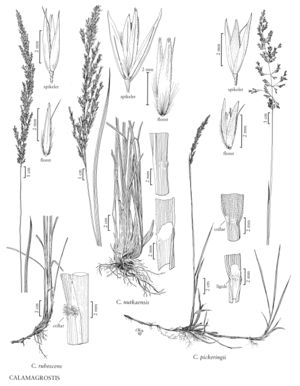Difference between revisions of "Calamagrostis pickeringii"
imported>Volume Importer |
imported>Volume Importer |
||
| Line 47: | Line 47: | ||
|publication year= | |publication year= | ||
|special status=Endemic | |special status=Endemic | ||
| − | |source xml=https://bitbucket.org/aafc-mbb/fna-data-curation/src/ | + | |source xml=https://bitbucket.org/aafc-mbb/fna-data-curation/src/200273ad09963decb8fc72550212de541d86569d/coarse_grained_fna_xml/V24/V24_1024.xml |
|subfamily=Poaceae subfam. Pooideae | |subfamily=Poaceae subfam. Pooideae | ||
|tribe=Poaceae tribe Poeae | |tribe=Poaceae tribe Poeae | ||
Latest revision as of 16:21, 11 May 2021
Plants without sterile culms; weakly cespitose, with rhizomes 2-8 cm long, about 1.5 mm thick. Culms (17)25-55(90) cm, solitary or in small clusters, unbranched, sparsely scabrous; nodes 1-3. Sheaths and collars smooth; ligules 2-3(5) mm, truncate to obtuse, entire, sometimes weakly lacerate; blades (3)6-17(38) cm long, (2)3-4(7) mm wide, flat, stiff, abaxial surfaces smooth or scabrous, adaxial surfaces slightly scabrous, glabrous or sparsely hairy. Panicles (3.5)5-12(15) cm long, (0.5)1-2(3.5) cm wide, contracted, erect, greenish to purplish; branches (1.5)2-3(4) cm, sparsely scabrous, usually spikelet-bearing on the distal 1/2 - 2/3, sometimes to the base. Spikelets (2.5)3-4(4.5) mm; rachilla prolongations 0.2-1.3(1.5) mm, sparsely bearded, hairs about 1.5 mm. Glumes keeled, usually scabrous on the keel tips, lateral veins obscure, not raised, apices acute; callus hairs (0.3)0.5-1 mm, 0.2-0.3 times as long as the lemmas, sparse; lemmas 2.5-3(3.5) mm, (0)0.5-1 mm shorter than the glumes; awns 1.5-2(2.5) mm, attached to the lower 2/5 – 3/5 of the lemmas, sometimes slightly exserted, distinct from the callus hairs, bent; anthers 1.5-2 mm. 2n = 28.
Distribution
Maine, N.H., N.J., Mass., N.B., Nfld. and Labr., N.S., Ont., N.Y., Vt.
Discussion
Calamagrostis pickeringii grows in bogs, open white spruce scrub, wet meadows, coastal peatlands and lake shores, heaths, frost pockets (hollows), pitch pine barrens, and on sandy beaches, at 0-1600 m. It is found from Newfoundland and Nova Scotia south to the mountains of New Hampshire, New York, and New Jersey.
Selected References
None.
